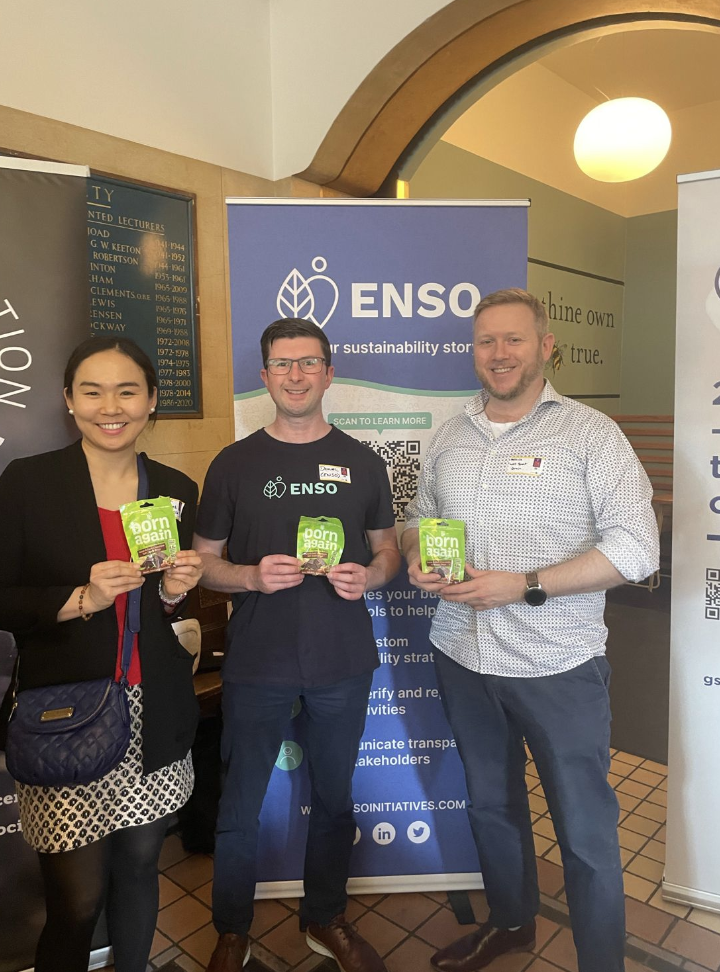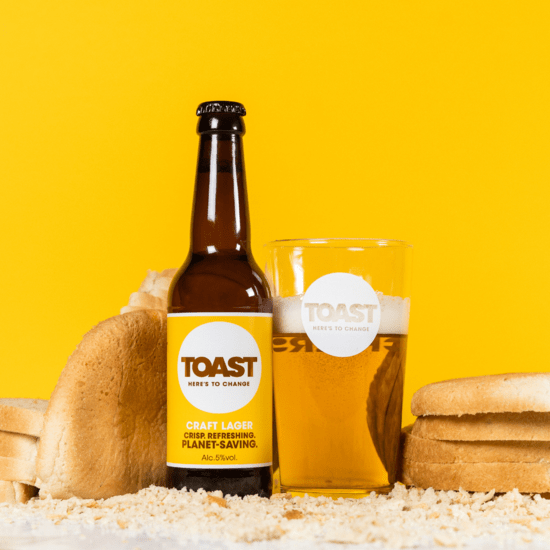The Top 6 Ways the Food & Drink Industry is Embracing Sustainability
Over the last decade, sustainability in the food and drink industry has become a major talking point with numerous businesses emerging as trailblazers in their approaches. We recently got to talk with Mena Fitzgibbon & Donal Quinn, founder of Enso Initiatives, about the six key strategies they’ve seen pioneering food & drink businesses implementing to embrace sustainability.
Read below to see their examples to inspire your own food & drink sustainability journey and see what the top trends are that are impacting the marketplace. Don’t be afraid to reach out to Esno Initiatives if you want to see how their platform can help you.
1. Plant-Based Alternatives: Reducing Environmental Footprints, One Bite at a Time
The way society is growing, processing, and consuming food is having a huge impact on the environment. Many businesses in the food and drink industry are now revolutionising their offerings by introducing more plant-based alternatives as the trend towards an eco-conscious diet continues to grow. Research showed that the number of people going vegan in Great Britain quadrupled between 2014 and 2019 and market intelligence agency Mintel also found that in 2021, 50% of British people were eating meat substitutes. By embracing this shift, companies are tackling issues such as greenhouse gas emissions and land degradation associated with livestock farming.
An example of a company that is pioneering the way in plant based alternatives is Beyond Meat, a Los Angeles–based producer of plant-based meat substitutes founded in 2009 by Ethan Brown with the stated mission of combating climate change. The People for the Ethical Treatment of Animals named Beyond Meat as its Company of the Year for 2013, and today their products are now available at about 191,000 locations in more than 80 countries globally.
2. Waste Reduction and Recycling: Minimising Waste, Maximising Potential
Efforts to minimise waste and increase recycling are becoming central to the food and drink industry's sustainability agenda. Companies are implementing strategies to reduce food waste throughout the supply chain, from farm to plate. Additionally, they are investing in innovative recycling programmes and circular economy practices, ensuring that packaging materials have a second life. By embracing this approach to waste management, businesses are lessening the demand for raw materials resulting in lower costs, lower waste bills, more impactful relationships with customers through return and recycle programs, leading to the overall reduction of their environmental impact.
A great example of a business that is embracing the circular economy is Toast, a brewery in the UK, that replaces barley with surplus bread in their brewing process. By repurposing bread from other businesses that would have otherwise been thrown away, Toast prevents waste, lowers their carbon emissions, and reduces their energy and water usage. The circular economy is perfectly demonstrated in this example: waste is reduced and value is created with excess product from other businesses.
3. Sustainable Sourcing: Ethical Choices for a Better Future
Sustainability is a multifaceted concept that encompasses considerations for social, ethical, and environmental factors. Often, sustainable sourcing is only considered to include actions concerning a company's environmental impact. True sustainable sourcing relies on the broader definition of sustainability and integrates social, economic, and environmental factors.
Many businesses in the food and drink industry are now prioritising responsible sourcing practices by partnering with suppliers who share their commitment to environmentally friendly and ethical standards. This includes considering the environmental impact of sourced materials, the well-being of communities near suppliers, and the financial stability and energy demands of suppliers. By choosing the right suppliers, companies can reduce risks, costs, and increase revenue.
Ben and Jerry’s has multiple policies in place to ensure sustainable sourcing for their ingredients and raw materials. Caring Dairy is a great example of this. As stated on their website, Ben and Jerry’s would not exist without quality dairy products. They implemented their Caring Dairy initiative to partner with their supplying farmers, which are primarily located in Vermont in the US, to support them in improving farming practices. The goals of this initiative are thriving farmers and farmworkers, healthy cows, and doing right by the environment.
4. Energy Efficiency: Energising Change for a Greener Industry
The majority of production processes cannot occur without some amount of energy use. Energy, both electrical and gas, is integral to businesses but can result in high levels of greenhouse gas emissions. Because of this, it is important for businesses to understand their current energy use and to set targets to reduce consumption.
The food and drink industry recognises the significance of energy efficiency in mitigating climate change. Companies are investing in energy-saving technologies, optimising transportation logistics, and incorporating renewable energy sources into their operations. By embracing energy efficiency, they are reducing environmental impact, mitigating the effects of the climate crisis, and directly reducing utility costs.
As an example, Tesco has invested over £700 million in energy and refrigeration efficiency improvements, reducing emissions from stores and distribution centers by 41%. They have also switched to 100% renewable energy in the UK and Ireland, invested £8million in onsite generation in Asia, and developed a cost-neutral renewable electricity plan to 2030 for the whole company.
5. Water Conservation: A Drop in the Bucket, a Ripple in the World
Water conservation is a pressing concern, and many businesses involved in the food and drink industry are taking meaningful steps to address it. Through water-efficient processes and technology upgrades, companies are minimising water usage in their operations.
By identifying areas for reduction and raising awareness among employees and consumers, businesses are making a positive impact on both their water bills and the environment.
In Diageo’s 10-year 'Society 2030: Spirit of Progress' ESG action plan for building a more inclusive and sustainable world, the company has committed to pioneering grain-to-glass sustainability, and their goal to preserve water for life is a vital part of this. Diageo has already improved the water efficiency of their operations by 50%. By 2030, their target is that every drink they make will on average use 30% less water and by 2026 they will replenish more water than they use in all water-stressed areas in which they operate.
6. Packaging Innovation: Rethinking Materials, Reducing Waste
A staggering 90% of plastic packaging becomes ‘waste’ after only one use. Many of these aren’t recyclable, and even if they are, only 4% is actually recycled. Yearly, c. 4x more plastic is being dumped in the ocean vs what is being recycled.
As a result, packaging plays a significant role in the industry's environmental impact. To address this, companies are embracing packaging innovations. They are exploring biodegradable or compostable materials, reducing single-use packaging, and promoting reusable or refillable options. By actively redesigning their packaging and using sustainable materials, such as vegan inks and glues, the industry is reducing plastic waste and promoting more eco-friendly practices.
Good Culture sets a perfect example by incorporating innovative packaging solutions and revolutionising the dairy category with its range of cultured products, crafted from milk sourced from humanely raised, grass-fed cows. Notably, the 100% recyclable containers feature a convenient paper-based outer label, ensuring effortless removal. Furthermore, the 16oz.(475 ml) tubs are designed for reusability, adding to their eco-friendly appeal.
The Need for a Sustainability Strategy & Transparent Communication
The food and drink industry's commitment to sustainability is evident through its transformative actions. However, all of this good work doesn’t come out of nowhere and in a constantly changing landscape, having a sustainability strategy and clear roadmap of what your business wants to achieve is not just a good idea, it’s essential for your brand to remain competitive and relevant.
To enact positive change, businesses should assess their impacts across various areas, including their supply chain, packaging, and waste management. Having a strategy in place will allow businesses to, where possible, embrace plant-based alternatives, reduce waste, practice sustainable sourcing, improve energy efficiency, conserve water, and drive packaging innovation.
In today's landscape, it has become crucial for companies to prioritise transparent communication with their customers. To tackle the issue of greenwashing and demonstrate their genuine commitment, companies need to publicly showcase their dedication to sustainability. Recognising the significance of accountability, the EU Parliament recently approved a negotiating mandate aimed at prohibiting the use of general environmental claims without substantiated evidence. By integrating sustainability practices early on, communicating their honest efforts supported by concrete evidence, and using clear and transparent language on their websites, social media platforms and packaging, businesses can develop a compelling narrative and cultivate consumer trust.
By learning from their peer’s initiatives, and communicating transparently, food & drink businesses can contribute to a greener and more environmentally conscious world.
It’s hard to navigate but both Bread & Jam and Enso are here to help. Don’t miss Bread & Jam Monday Motivations, a monthly online webinar series where we hear from 3 food & drink founders who have been there and done it. They share their real stories and sustainability is often a focus of ours.
ABOUT DONAL QUINN
Donal is the Founder of ENSO, an online platform that empowers businesses to create and communicate their own sustainability strategies. With a background in marketing and managing sustainability initiatives, Donal witnessed a knowledge gap between business practices and sustainability best practices. To address this, he developed the ENSO platform, enabling businesses to connect with customers, increase revenues, and have a positive impact on the environment and society. Donal is dedicated to driving sustainable change and inspiring businesses to integrate sustainability into their operations.
To learn more about ENSO visit www.ensoinitiatives.com




